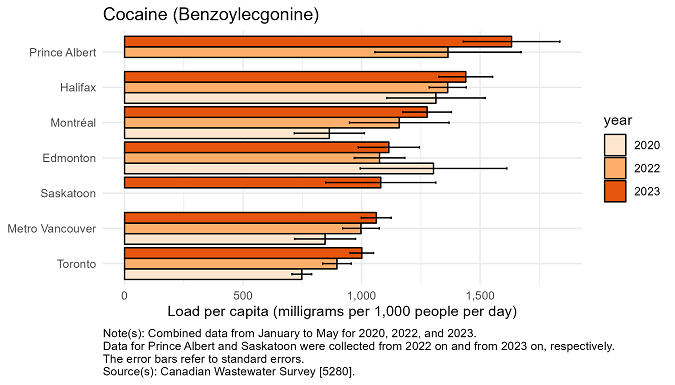Infographic 1
Combined cocaine (benzoylecgonine) daily load per capita for Halifax, Montréal, Toronto, Saskatoon, Prince Albert, Edmonton, and Metro Vancouver from January to May in 2020, 2022, and 2023

Infographic description
The title of the infographic is "Combined cocaine (benzoylecgonine) daily load per capita for Halifax, Montréal, Toronto, Saskatoon, Prince Albert, Edmonton, and Metro Vancouver from January to May in 2020, 2022, and 2023"
This infographic is a horizontal bar chart with error bars representing standard errors.
The X axis represents the load per capita.
The Y axis represents the cities of Halifax, Montréal, Toronto, Saskatoon, Prince Albert, Edmonton, and Metro Vancouver.
The unit of measure is milligrams per 1,000 people per day.
There are three series.
The first series, 2020, represents the daily load per capita in 2020.
The second series, 2022, represents the daily load per capita in 2022.
The third series, 2023, represents the daily load per capita in 2023.
For Prince Albert, there are 1,633 milligrams of cocaine (benzoylecgonine) per 1,000 people per day, with a standard error of plus minus 204 milligrams per 1,000 people per day in 2023.
For Prince Albert, there are 1,365 milligrams of cocaine (benzoylecgonine) per 1,000 people per day, with a standard error of plus minus 308 milligrams per 1,000 people per day in 2022.
For Halifax, there are 1,440 milligrams of cocaine (benzoylecgonine) per 1,000 people per day, with a standard error of plus minus 113 milligrams per 1,000 people per day in 2023.
For Halifax, there are 1,363 milligrams of cocaine (benzoylecgonine) per 1,000 people per day, with a standard error of plus minus 78 milligrams per 1,000 people per day in 2022.
For Halifax, there are 1,314 milligrams of cocaine (benzoylecgonine) per 1,000 people per day, with a standard error of plus minus 208 milligrams per 1,000 people per day in 2020.
For Montréal, there are 1,277 milligrams of cocaine (benzoylecgonine) per 1,000 people per day, with a standard error of plus minus 102 milligrams per 1,000 people per day in 2023.
For Montréal, there are 1,159 milligrams of cocaine (benzoylecgonine) per 1,000 people per day, with a standard error of plus minus 210 milligrams per 1,000 people per day in 2022.
For Montréal, there are 864 milligrams of cocaine (benzoylecgonine) per 1,000 people per day, with a standard error of plus minus 148 milligrams per 1,000 people per day in 2020.
For Edmonton, there are 1,115 milligrams of cocaine (benzoylecgonine) per 1,000 people per day, with a standard error of plus minus 129 milligrams per 1,000 people per day in 2023.
For Edmonton, there are 1,076 milligrams of cocaine (benzoylecgonine) per 1,000 people per day, with a standard error of plus minus 107 milligrams per 1,000 people per day in 2022.
For Edmonton, there are 1,303 milligrams of cocaine (benzoylecgonine) per 1,000 people per day, with a standard error of plus minus 309 milligrams per 1,000 people per day in 2020.
For Saskatoon, there are 1,081 milligrams of cocaine (benzoylecgonine) per 1,000 people per day, with a standard error of plus minus 232 milligrams per 1,000 people per day in 2023.
For Metro Vancouver, there are 1,062 milligrams of cocaine (benzoylecgonine) per 1,000 people per day, with a standard error of plus minus 63 milligrams per 1,000 people per day in 2023.
For Metro Vancouver, there are 997 milligrams of cocaine (benzoylecgonine) per 1,000 people per day, with a standard error of plus minus 77 milligrams per 1,000 people per day in 2022.
For Metro Vancouver, there are 846 milligrams of cocaine (benzoylecgonine) per 1,000 people per day, with a standard error of plus minus 128 milligrams per 1,000 people per day in 2020.
For Toronto, there are 1,001 milligrams of cocaine (benzoylecgonine) per 1,000 people per day, with a standard error of plus minus 49 milligrams per 1,000 people per day in 2023.
For Toronto, there are 896 milligrams of cocaine (benzoylecgonine) per 1,000 people per day, with a standard error of plus minus 60 milligrams per 1,000 people per day in 2022.
For Toronto, there are 748 milligrams of cocaine (benzoylecgonine) per 1,000 people per day, with a standard error of plus minus 41 milligrams per 1,000 people per day in 2020.
Note(s): Combined data from January to May from 2020, 2022, and 2023.
Data for Prince Albert and Saskatoon were collected from 2022 on and from 2023 on, respectively.
The error bars refer to standard errors.
Source(s): Canadian Wastewater Survey [5280].
- Date modified: